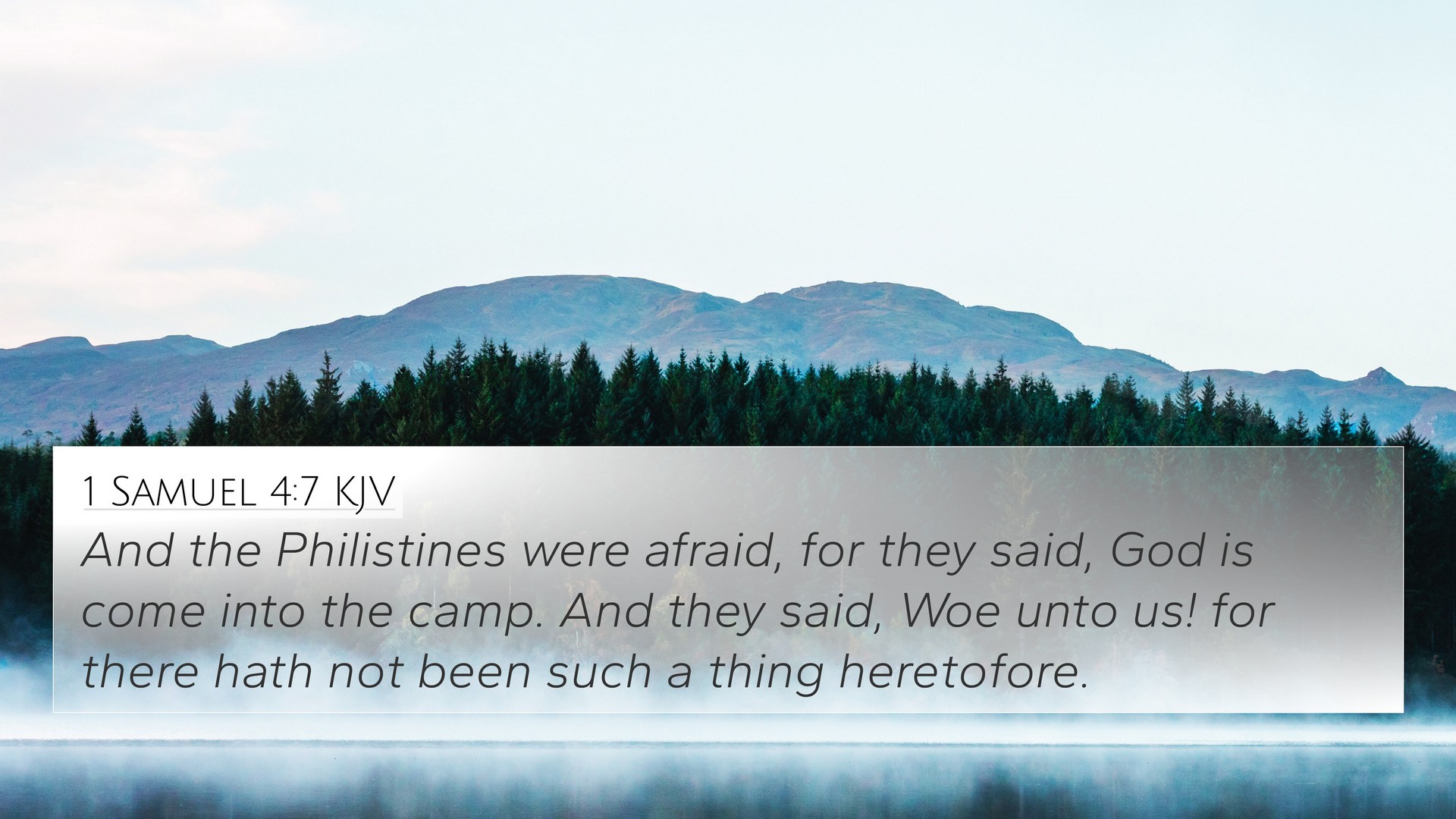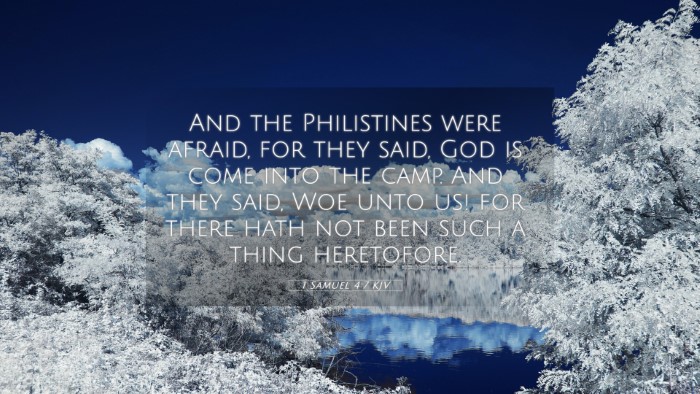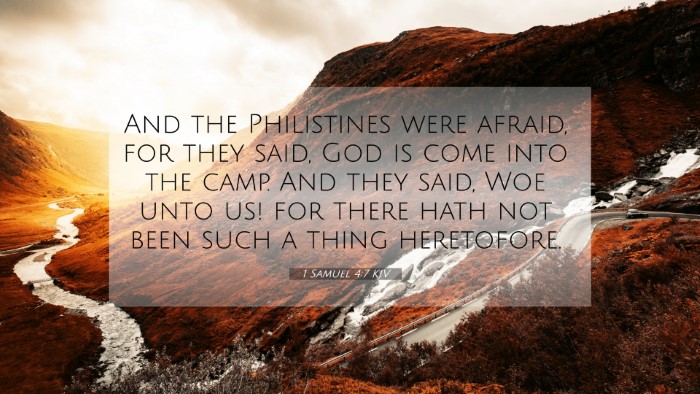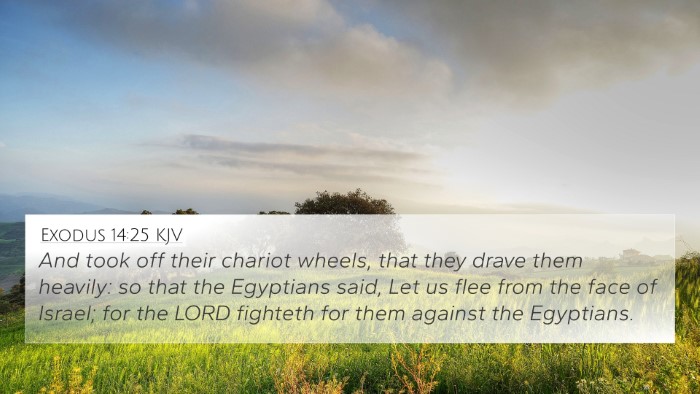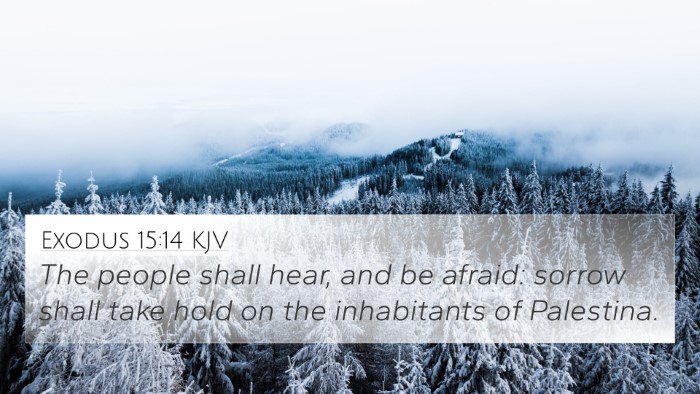Understanding 1 Samuel 4:7
The verse 1 Samuel 4:7 states: "And the Philistines were afraid, for they said, God is come into the camp. And they said, Woe unto us! for there hath not been such a thing heretofore." This passage highlights a moment of fear and recognition of divine presence among the Philistines during a critical battle against Israel.
Verse Context
In the larger narrative, the Israelites attempted to use the Ark of the Covenant as a talisman for victory in their battle against the Philistines. However, it was not merely the presence of the Ark, but the acknowledgement of God's power that instilled fear in their enemies.
Commentary Insights
-
Matthew Henry's Commentary:
Henry discusses the reaction of the Philistines, emphasizing that they recognized the presence of God as a decisive factor that caused them to fear. He notes that their acknowledgment of God's intervention signifies that they understood the true nature of Israel's God, not just as a symbol but as a living, powerful entity actively involved in the affairs of His people.
-
Albert Barnes' Commentary:
Barnes outlines the significance of fear among the Philistines, depicting it as an instinctive response to the understanding that they were facing a powerful deity, one they believed could turn the tide of battle. The expression "Woe unto us!" reflects their despair and the understanding that defeat against such a God would be inevitable.
-
Adam Clarke's Commentary:
Clarke highlights the implications of this fear, suggesting that it was rooted in their previous experiences with the God of Israel and the stories they had heard. He mentions that this fear served as a psychological weapon on the battlefield, demonstrating how belief in God’s might can affect both morale and tactics in warfare.
Thematic Connections
This verse has numerous connections with other biblical scripture, revealing thematic parallels and offering deeper understanding through cross-referencing. Below are some related Bible verses:
- Exodus 15:14-16: Illustrates the fear of nations when they heard of God's powerful acts and deliverance.
- 1 Samuel 17:45-47: David’s declaration against Goliath highlights the recognition of God in battle.
- Deuteronomy 7:21: Advises the Israelites not to fear their enemies, for God is among them.
- Joshua 2:9-11: Rahab's declaration of fear among the Jericho inhabitants upon hearing of God’s works.
- Psalms 46:1-3: Proclaims God as a refuge, leading to a fearless stance against turmoil.
- Psalms 68:1-2: Refers to God arising to dispel His enemies and brings fear upon them.
- Philippians 2:10-11: Speaks of every knee bowing before Jesus, indicative of ultimate recognition of God’s authority.
Insights and Interpretations
The recognition of God’s presence generates a profound shift in any situation, whether it be in battle or in the circumstances of daily life. The fear experienced by the Philistines presents a duality—we are reminded of God’s sovereignty while also being cautioned against presuming upon His power as mere superstition.
As we delve deeper into the connections between Bible verses, we see that understanding God’s roles in various contexts unveils rich layers of meaning. Tools for Bible cross-referencing, such as concordances or systematic cross-reference guides, can be instrumental in identifying these thematic ties.
By engaging in cross-referencing Bible study methods, we facilitate a more comprehensive understanding of scripture which not only enriches personal faith but also allows for a broader interpretation and application in community and church settings.
Conclusion
1 Samuel 4:7 serves as a pivotal verse illustrating the power of God recognized by His enemies, culminating in fear and despair. Through comparative Bible verse analysis, we link this moment in history with various themes of divine intervention across scripture, enhancing our understanding of God’s nature and involvement in human affairs.
